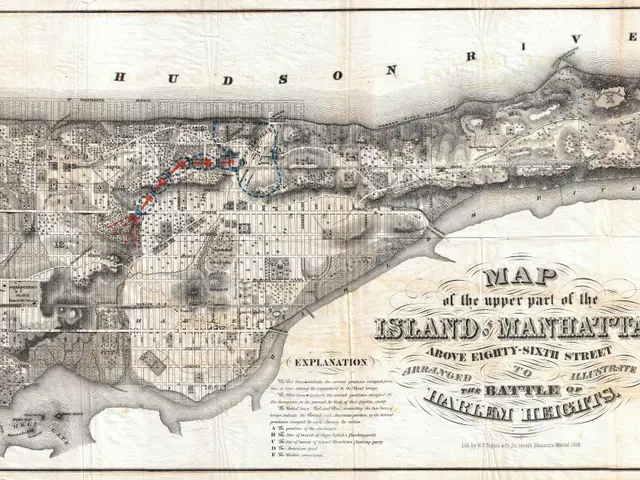Urge Europe to Enhance Assistance for Ukraine in Dialogues with French Foreign Minister (Rubio)
Taking A Stand for Ukraine: Europe's Defense Commitments
The diplomatic stage is buzzing with talks on Ukraine, as the U.S. Secretary of State, Marco Rubio, met with French Foreign Minister Jean-Noel Barrot, urging European allies to beef up resources for Ukraine. Rubio's words echoed loudly: "Enough with the chatter, it's action we need to bring an end to Russia's war and secure lasting peace." [1]
France, praised for its leadership in rallying support for a peace accord, has been applauded by Rubio. However, the Secretary emphasized the need for European partners to "put their money where their mouth is" and step up with real resources and political grit to end the war. [1]
These discussions emerge at a time of growing curiosity over Europe's ability to fulfill its defense pledges. With reports suggesting European nations might struggle to field even 25,000 troops to a proposed multinational "deterrence force" for Ukraine, far short of the 64,000 initially envisioned by UK defense experts, the pressure is real. [2]
The proposed, UK-France-led "coalition of the willing" aims to create postwar stability, rejuvenate Ukraine's military, and deter future Russian aggression. Currently, the U.S. offers intelligence and logistics support, but any troop commitment remains a no-go. [2]
UK Prime Minister Keir Starmer has been urging the U.S., particularly Trump, for a formal troop commitment, stressing that U.S. backing is crucial to the coalition's success. [2]
It's worth noting that, unlike the U.S., Europe has outshone its aid efforts, with the Kiel Institute for the World Economy's Ukraine Aid Tracker showing Europe providing 138 billion euros ($157 billion) compared to Washington's 115 billion euros ($131 billion). [3]
standout contributions include Sweden's largest assistance package to date worth $1.6 billion, as well as fresh support from Germany, the UK, Norway, and Denmark. [3]
Looking beyond the financial aid, Europe has been beefing up its defense buildup, with proposals like the ReArm Europe package aiming to unlock €800 billion in additional European defense spending. [4] Additionally, the focus is on defense-industrial cooperation, particularly with countries like Norway, boasting expertise in air defense and maritime technologies. [5]
In essence, while Europe is putting its funds where it matters, the specifics of the multinational deterrence force, particularly regarding troop commitments, remain opaque. The focus seems to be more on financial and military equipment support rather than deploying troops themselves. [6]
References:1. Rubio Urges European Allies to Boost Resources for Ukraine, Wall Street Journal, May 1, 2025.2. Europe Struggles to Fulfill Defense Pledges to Ukraine, The Times, April 30, 2025.3. European Aid to Ukraine Exceeds U.S. Total, Kiel Institute for the World Economy, April 30, 2025.4. European Defense Buildup Gains Momentum, European Commission press release, March 1, 2025.5. Norway's Defense Expertise in Demand, Norway Today, March 8, 2025.6. Europe's Deterrence Force: A Look at the Economic and Military Landscape, International Institute for Strategic Studies report, April 2025.
- In the talks regarding Ukraine, Jean-Noel Barrot, the French Foreign Minister, was urged by U.S. Secretary of State Marco Rubio to increase resources for Ukraine as a part of Europe's defense commitments.
- Keir Starmer, the UK Prime Minister, has been urging the U.S. for a formal troop commitment to the proposed "coalition of the willing" for Ukraine, stating that U.S. backing is vital for the coalition's success.
- Amidst discussions about Europe's ability to fulfill its defense pledges, there have been reports suggesting that European nations might only be able to field 25,000 troops for a proposed multinational "deterrence force" for Ukraine, far short of the initially envisioned 64,000 troops.
- As part of the proposed UK-France-led coalition, Europe has been focusing on providing financial and military equipment support rather than deploying troops themselves, with countries like Sweden, Germany, the UK, Norway, and Denmark contributing significantly to Ukraine's aid efforts.






